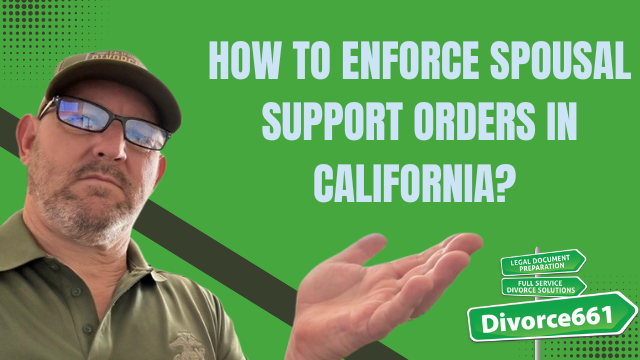How to Enforce Spousal Support Orders in California? | Los Angeles Divorce
I’m Tim Blankenship with Divorce661. If your ex has stopped paying spousal support in California, don’t panic — the courts provide several effective tools to help you collect what you’re owed. In this article I’ll explain the enforcement options available, how to start the process, and a real client example that shows how fast things can get back on track when you act promptly.
Why you should act quickly
When spousal support stops, unpaid amounts can add up fast. Interest may be added to the arrears, and delays make collection harder. Filing an enforcement request with the court as soon as payments stop preserves your rights and gives the court a chance to intervene before the debt grows larger.
Legal tools the court can use to enforce spousal support
The California court system has several enforcement mechanisms designed to ensure compliance with spousal support orders. Here are the primary options:
-
- Wage garnishment / wage assignment: The court can issue a wage assignment that directs your ex‑spouse’s employer to withhold support from their paycheck and send it directly to you. If your ex changes jobs, the court can issue a new wage assignment so payments resume automatically at the new employer.
- Contempt of court: If someone willfully refuses to comply with a support order, the court can hold them in contempt. Contempt can carry fines, jail time, and other penalties intended to coerce compliance.
- Interest and arrears collection: Unpaid spousal support typically accrues interest. The court can order payment of the arrears plus interest, and enforcement actions prioritize getting that money to you.
- Coordination with government enforcement agencies: Agencies such as the Department of Child Support Services (DCSS) can assist in collection and use additional enforcement tools.
Other enforcement options (overview)
Beyond wage garnishments and contempt, courts and agencies can use liens, bank levies, interception of tax refunds, and reporting to credit agencies in appropriate cases. The specific steps depend on your order and circumstances.
Real client example: how enforcement worked in practice
A recent client came to us after their ex stopped paying support shortly after changing jobs. They weren’t sure what to do next. We filed enforcement paperwork with the court and requested a new wage assignment. The court issued the wage assignment to the new employer and payments resumed automatically — without a drawn‑out courtroom battle.
Don’t let unpaid support pile up. Act promptly to secure your financial future.
How to start: filing an enforcement request
Here are the practical steps to take if support payments stop:
-
- Document missed payments and any communication with your ex about payments.
- File an enforcement request with the family court that issued your spousal support order.
- Request a wage assignment if the payor is employed. Provide current employer information if you have it.
- Ask the court to calculate arrears and interest so you know what’s owed.
- Consider involving DCSS if you want state enforcement assistance.
- Work with an attorney or a flat‑fee enforcement service to prepare and file the paperwork if you prefer professional help.
How Divorce661 can help
At Divorce661 we handle enforcement requests from start to finish across California. Our services include filing enforcement paperwork, coordinating wage garnishments, calculating arrears and interest, and working with agencies like DCSS. We offer flat‑fee services and a free consultation to discuss your situation and the fastest path to getting payments resumed.
Practical tips and final thoughts
-
- Keep good records: retain payment histories, court orders, and any employer information you have for the payor.
- Act quickly: delays make collection harder and allow interest to grow on arrears.
- Use the right tool: wage garnishments can restart payments automatically, while contempt may be appropriate if the payor is deliberately refusing to comply.
- Get help if you need it: enforcement procedures are procedural and time‑sensitive. Professional help can speed up results and reduce stress.
If you’re dealing with unpaid spousal support in California, schedule a free consultation with us at Divorce661. Visit divorce661.com to get started and regain control over your financial future.

